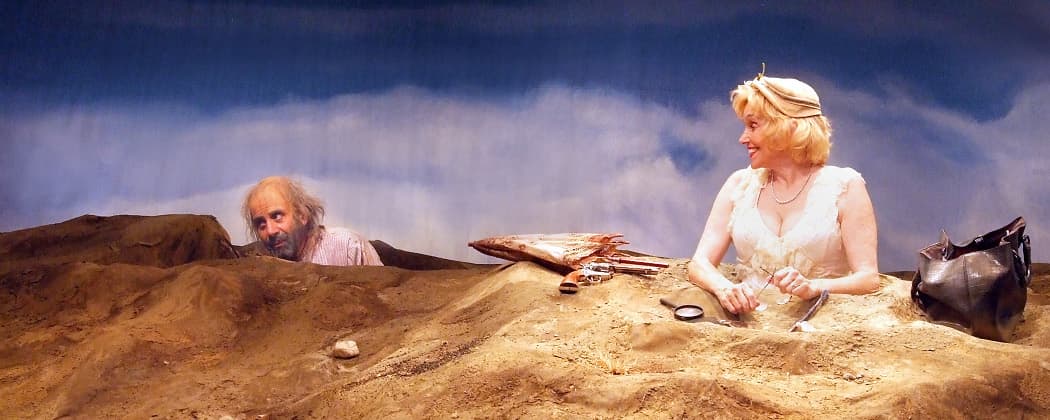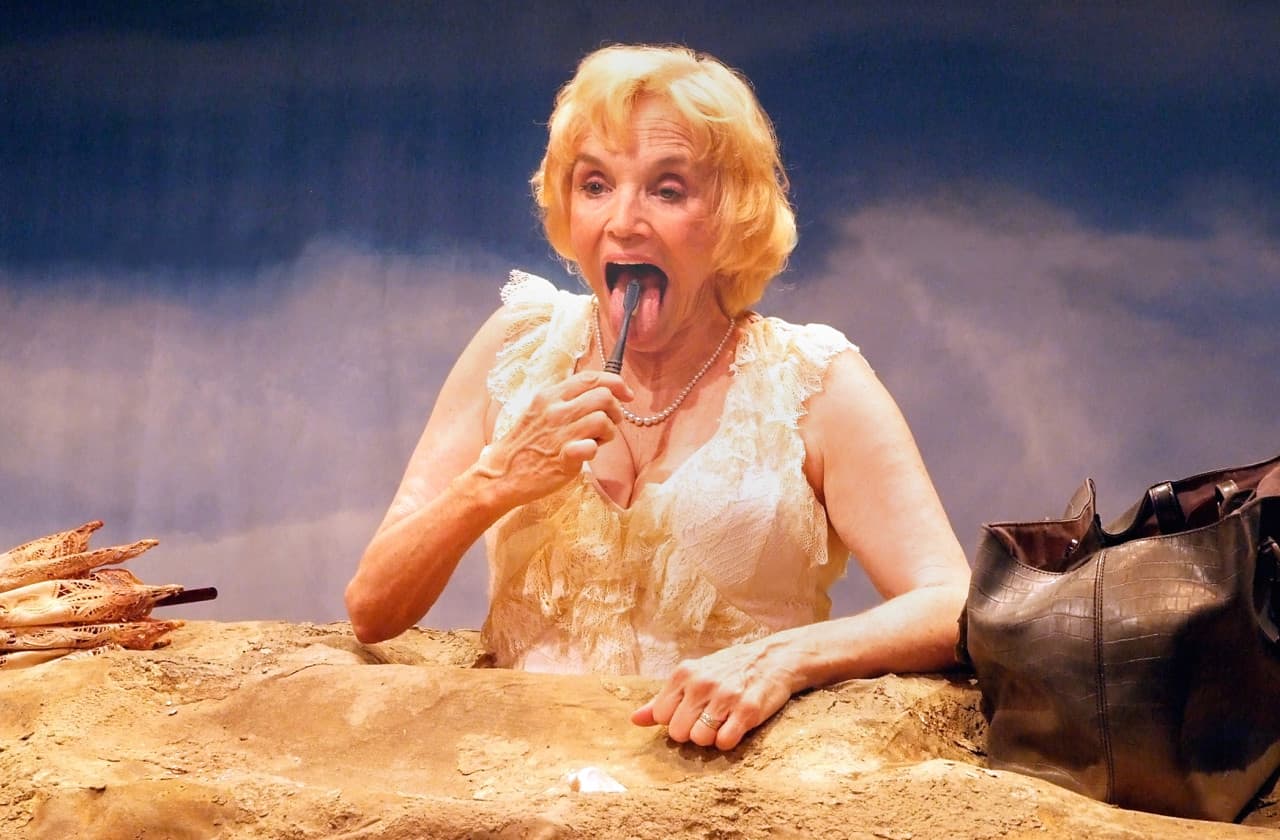Advertisement
Beckett's 'Happy Days' Is Indeed Happy With Brooke Adams At Babson

Brooke Adams’ Winnie is a heroine (and I do not use the term loosely) with a thousand faces. Which is a good thing, since the valiantly upbeat protagonist of Samuel Beckett’s 1961 “Happy Days,” who is buried in sand beneath a scorching sun, has few other body parts to work with.
But Adams, beneath a blonde wig and sweet little hat, displays a countenance of pretty putty — now flirty, now wistful, now rueful, now morose or even tragic, as the character makes her brave way through two “happy days” as blandly endless as heaven.
Winnie’s is a virtual monologue interrupted only by a harsh buzzer cueing waking and sleeping and the occasional, welcome incursions of onetime lover Willie, who lives in a hole behind Winnie’s earth prison and makes more guttural noise than conversation.
In conveying this uneven relationship, film, television and stage veteran Adams is abetted by her real-life spouse, Emmy-winning Broadway and “Monk” star Tony Shalhoub, who plays opposite (or, more accurately, behind) her in director Andrei Belgrader’s wrenchingly lighthearted production—created for Pasadena’s Theatre @ Boston Court and happily brought to Babson College’s Carling-Sorenson Theater by Commonwealth Shakespeare Company.
The connections here are numerous, and they all track back to American Repertory Theater in its original incarnation. Shalhoub was a company member in the 1980s; Adams performed there as well, most recently appearing in Boston in A.R.T. founding artistic director Robert Brustein’s “The Last Will.” Belgrader helmed, among other memorable things, an award-winning “Waiting for Godot” for A.R.T. in 1983, and Steven Maler, artistic director of the free Shakespeare-on-Boston-Common custodian Commonwealth Shakespeare Company, got his start there too.
But whatever old alliances bring us, however briefly (through Nov. 23), this production, it’s a lovely one, faithful to Beckett from scenic designer Takeshi Kata’s bright blue trompe-l’oeil backdrop to the play’s ambiguous, here painfully balletic final image. Shalhoub is the funniest, most scabrous and physically effortful Willie I have ever seen, and Adams is an indomitable, comical, profoundly feminine Winnie.
“Waiting for Godot” has been famously described (by the Irish critic Vivian Mercier) as “a play in which nothing happens, twice.” “Happy Days,” which shares with “Godot” its vaudeville rituals and repetitions, is a play in which grooming happens, once. Act 1 finds Winnie rooted above the waist in earth, plump arms and ample décolletage sprouting from an arid mound like an unlikely flower. An alarm sounds. She wakes. She prays (only a few phrases are audible, “world without end” being most to the point).

Fishing in a large bag at her side for needed implements, she brushes her teeth with a vigor and thoroughness that demonstrate not only Adams’ rubbery countenance, but also the character’s commitment to her routine, to what’s left of her life. She arranges her coiffure, paints her lips, files her nails, and eventually pulls from her tote a revolver she calls “Brownie,” characteristically blabbing away at the unseen, monosyllabic Willie about the dear old firearm with which he once threatened to end his misery. “Oh I suppose it’s a comfort to know you’re there,” she sighs, addressing the gun, “but I’m tired of you.”
Whatever Chekhov advised with regard to weapons onstage, by Act 2 Winnie, at least, will have no recourse to Brownie—or to the comforts of the bag (which remains at her side, as large as her head). She is buried up to her chin now. Worse, Willie, who in the first act crawled from his hole to sunbathe naked, enjoy a dirty postcard, grunt answers to his chatty partner’s questions, would seem to have died or gone cruelly silent. So what is “I talk, therefore I am” without an answer?
“There is so little one can say, one says it all. All one can,” Winnie observes with rhythmic cheerfulness. And she remains undauntedly attached to appearances: to the ghosts of youth, beauty, the illusion of meaning. Robbed of hands to wield her compact mirror, she nonetheless takes account of her facial features. This affords Adams another opportunity to exercise her comically malleable countenance before Winnie resorts to a fragmented “Krapp’s Last Tape”-like memory of a long-ago lakeside outing and a story she tells herself “when all else fails.”
Adams has said she had trouble learning Winnie’s exhaustive, arguably prattling, if classically allusive, arias and that Belgrader came to her rescue by teaching her to sing them.
The tunefulness becomes more evident in Act 2, when more plangent notes intrude upon the play’s perky, if existentially bleak, melody. Here Winnie, deprived of every crutch but her fraying reason and a conditioned belief in some undefined “great mercies,” gets more plaintive, occasionally even petulant, without surrendering her determined optimism, her romantic ego, her sometimes sardonic wit.
She is a testament, I suppose, to the so-called human spirit, however foolish—though I suspect Beckett’s sympathies lie more with Willie, straining at the end toward not moldering love but the gun.
Carolyn Clay was for many years the theater editor and chief drama critic for the Boston Phoenix. She is a past winner of the George Jean Nathan Award for Dramatic Criticism.
